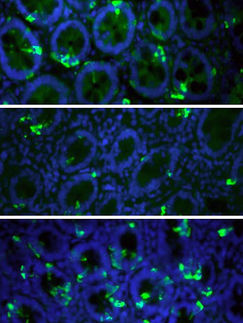Factor has pivotal role in obesity, metabolic syndrome
Advertisement
A protein known to play a role in development and the formation of organs is also an important factor in the control of obesity and diabetes, said researchers from Baylor College of Medicine in a report that appears in Cell metabolism.
Drs. Ming-Jer and Sophia Tsai, professors of molecular and cellular biology at BCM, have studied COUP-TFII (Chicken Ovalbumin Upstream Promoter Transcription Factor II) for decades, but only when they bred mice that had only one gene copy for the factor did they find that the animals had smaller fat cells and increased energy metabolism as well as enhanced response to insulin.
"If a mouse loses one copy of the gene, the animal becomes lean," said Ming-Jer Tsai. "It is more sensitive to the effects of insulin and resistant to obesity from a high fat diet." Their studies raise the likely possibility that one can use COUP-TFII as a potential drug target for diabetes and obesity treatment. Identifying a drug that could reduce the effect of COUP-TFII activity has become a future focus for their research, said Sophia Tsai.
"We don't need to inhibit it totally," she said. "Partial inhibition will do the trick as when you lose one copy of the gene, your fat cells are already much smaller and the animal is lean." The animals not only have less fat, they also have more muscle and burn more energy, said Ming-Jer Tsai.
Most read news
Organizations
Other news from the department science

Get the life science industry in your inbox
By submitting this form you agree that LUMITOS AG will send you the newsletter(s) selected above by email. Your data will not be passed on to third parties. Your data will be stored and processed in accordance with our data protection regulations. LUMITOS may contact you by email for the purpose of advertising or market and opinion surveys. You can revoke your consent at any time without giving reasons to LUMITOS AG, Ernst-Augustin-Str. 2, 12489 Berlin, Germany or by e-mail at revoke@lumitos.com with effect for the future. In addition, each email contains a link to unsubscribe from the corresponding newsletter.






















































